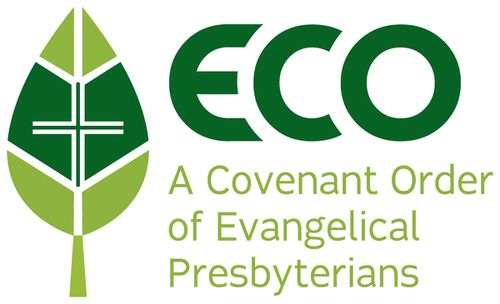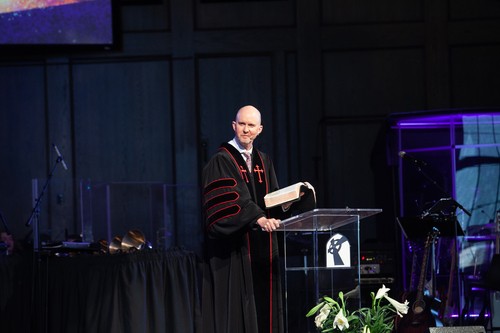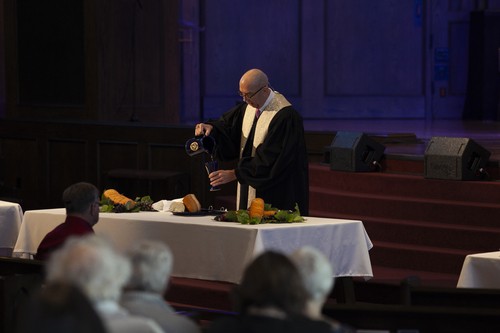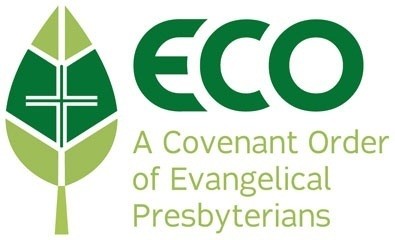What We Believe
At First Presbyterian Church we worship the Triune God: Father, Son and Holy Spirit. We believe that Jesus Christ died and rose again to pay completely for our sin and unite us eternally with God. We believe that the Bible is the infallible Word of God. We believe that all our faith, ministry and our growth as a follower of Jesus happens by the work of the Holy Spirit. We believe we have all sinned, fallen short of the glory of God and stand in desperate need of His irresistible grace.
We stand broadly in the Reformed and Evangelical tradition.
We stand broadly in the Reformed and Evangelical tradition.
The word “Presbyterian” comes from the New Testament word “presbuteros” which means “elder.” Elders have always been called by God to lead His people in humility and community to live that glorify and honor Him. In the New Testament book Titus, we are instructed, “Appoint elders in every town as I directed you.”
This says so much about who we are First Pres and who we believe God calls us to be. God wants to see each of grow into the fullness of who He has made us to be and that growth happens through relationships and community. God has a plan for every one of us that is revealed not only through prayer and the Bible but also through other people.
This says so much about who we are First Pres and who we believe God calls us to be. God wants to see each of grow into the fullness of who He has made us to be and that growth happens through relationships and community. God has a plan for every one of us that is revealed not only through prayer and the Bible but also through other people.
Our Movement: The Covenant Order of Evangelical Presbyterians
First Presbyterian Church of Edmond is a partner congregation in the Presbyterian movement, the Covenant Order of Evangelical Presbyterians or ECO for short. The name represents a three-fold commitment to: make disciples of Jesus Christ (Evangelical), connect leaders through accountable biblical relationships founded in God’s grace (Covenant) and commit to a shared way of life together (Order).
The acronym ECO also speaks to the denomination’s commitment to strengthen the “ecosystems” of local churches, providing the resources needed to grow, thrive and reproduce. Just as earthly ecosystems draw richness from the right kind of diversity, ECO is committed to unleashing the ministry gifts of women, men, young leaders, and every ethnicity. ECO’s name also draws from the Greek term oikos, meaning “household,” used in the Bible to reference the network of relationships that nurture an individual.
ECO Holds to Nine Core Values:
Jesus-shaped Identity:
We believe Jesus Christ must be at the center of our lives and making disciples of Jesus at the core of our ministry.
Biblical Integrity:
We believe the Bible is the unique and authoritative Word of God, which teaches all that is necessary for faith and life. The prominence of God’s Word over our lives shapes our priorities, and the unrivaled authority of the Bible directs our actions to be in concert with Christ’s very best for our lives.
Thoughtful Theology:
We believe in theological education, constant learning, and the life of the mind, and celebrate this as one of the treasures of our Reformed heritage.
Accountable Community:
We believe guidance is a corporate spiritual experience. We want to connect leaders to one another in healthy relationships of accountability, synergy, and care.
Egalitarian Ministry:
We believe in unleashing the ministry gifts of women, men, and every ethnic group.
Missional Centrality:
We believe in living out the whole of the Great Commission – including evangelism, spiritual formation, compassion, and redemptive justice – in our communities and around the world.
Center-focused Spirituality:
We believe in calling people to the core of what it means to be followers of Jesus – what “mere Christianity” is and does – and not fixate on the boundaries.
Leadership Velocity:
We believe identifying and developing gospel-centered leaders is critical for the church, and a great leadership culture is risk-taking, innovative, and organic.
Kingdom Vitality:
We believe congregations should vigorously reproduce new missional communities to expand the Kingdom of God.
ECO holds authoritative these historic creeds and confessions:
Nicene Creed
Apostles’ Cree
The Heidelberg Catechism
The Westminster Standards
The Theological Declaration of Barmen
Apostles’ Cree
The Heidelberg Catechism
The Westminster Standards
The Theological Declaration of Barmen

I.God’s Word: We glorify God by recognizing and receiving His authoritative self- revelation, both in the infallible Scriptures of the Old and New Testaments and also in the incarnation of God the Son.
II.Trinity: With Christians everywhere, we worship the only true God; Father, Son, and Holy Spirit—who is both one essence and three persons.
III. Incarnation: We believe Jesus Christ is both truly God and truly human.
IV. State of Humanity: The present disordered state of the world, in which we and all things are subject to misery and to evil, is not God’s doing, but is rather a result of humanity’s free, sinful rebellion against God’s will.
V. Condemnation: Although we are each deserving of God’s eternal condemnation, the eternal Son assumed our human nature, joining us in our misery and offering Himself on the cross in order to free us from slavery to death and sin
VI. Grace: Because of humanities sinful rebellion, are only hope is God’s Grace. In union with Christ through the power of the Spirit we are brought into right relation with the Father, who receives us as His adopted children. Jesus Christ is the only Way to this adoption, the sole path by which sinners become children of God.
VII. Election: Having lost true freedom of will in the fall, we are incapable of turning toward God of our own volition. We who receive Him and believe in His name do so not by our own will or our wisdom, but because His glory compels us irresistibly to turn toward Him. By His enticing call on our lives, Jesus enlightens our minds, softens our hearts, and renews our wills, restoring the freedom that we lost in the fall.
VIII. The Church: Within the covenant community of the church, God’s grace is extended through the preaching of the Word, the administration of the Sacraments, and the faithful practice of mutual discipline.
IX. Sacraments: We have two sacraments: Baptism and the Lord’s Supper
X. Egalitarian: We affirm that men and women alike are called to all the ministries of the Church, and that every member is called to share in all of Christ’s offices within the world beyond the church.
XI. Secondary Authority: We affirm the following ECO Confessional Standards as faithful expositions of the Word of God: Nicene Creed, Apostles’ Creed, Heidelberg Catechism, Westminster Confession, Westminster Shorter Catechism, Westminster Larger Catechism and the Theological Declaration of Barmen.
ECO Theology. (July 2024.). https://www.theology-eco.org/
II.Trinity: With Christians everywhere, we worship the only true God; Father, Son, and Holy Spirit—who is both one essence and three persons.
III. Incarnation: We believe Jesus Christ is both truly God and truly human.
IV. State of Humanity: The present disordered state of the world, in which we and all things are subject to misery and to evil, is not God’s doing, but is rather a result of humanity’s free, sinful rebellion against God’s will.
V. Condemnation: Although we are each deserving of God’s eternal condemnation, the eternal Son assumed our human nature, joining us in our misery and offering Himself on the cross in order to free us from slavery to death and sin
VI. Grace: Because of humanities sinful rebellion, are only hope is God’s Grace. In union with Christ through the power of the Spirit we are brought into right relation with the Father, who receives us as His adopted children. Jesus Christ is the only Way to this adoption, the sole path by which sinners become children of God.
VII. Election: Having lost true freedom of will in the fall, we are incapable of turning toward God of our own volition. We who receive Him and believe in His name do so not by our own will or our wisdom, but because His glory compels us irresistibly to turn toward Him. By His enticing call on our lives, Jesus enlightens our minds, softens our hearts, and renews our wills, restoring the freedom that we lost in the fall.
VIII. The Church: Within the covenant community of the church, God’s grace is extended through the preaching of the Word, the administration of the Sacraments, and the faithful practice of mutual discipline.
IX. Sacraments: We have two sacraments: Baptism and the Lord’s Supper
X. Egalitarian: We affirm that men and women alike are called to all the ministries of the Church, and that every member is called to share in all of Christ’s offices within the world beyond the church.
XI. Secondary Authority: We affirm the following ECO Confessional Standards as faithful expositions of the Word of God: Nicene Creed, Apostles’ Creed, Heidelberg Catechism, Westminster Confession, Westminster Shorter Catechism, Westminster Larger Catechism and the Theological Declaration of Barmen.
ECO Theology. (July 2024.). https://www.theology-eco.org/


